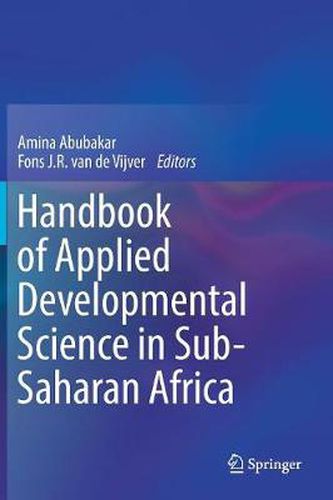Readings Newsletter
Become a Readings Member to make your shopping experience even easier.
Sign in or sign up for free!
You’re not far away from qualifying for FREE standard shipping within Australia
You’ve qualified for FREE standard shipping within Australia
The cart is loading…






This title is printed to order. This book may have been self-published. If so, we cannot guarantee the quality of the content. In the main most books will have gone through the editing process however some may not. We therefore suggest that you be aware of this before ordering this book. If in doubt check either the author or publisher’s details as we are unable to accept any returns unless they are faulty. Please contact us if you have any questions.
This handbook collates research evidence and presents the most up-to-date findings on child development in Sub-Saharan Africa. It discusses complex risk factors and medical conditions affecting childhood outcomes, and spotlights emerging programs for enhancing literacy and cognitive development. The panel of expert contributors offer needed context and knowledge to the discussion of previously understudied topics. Chapters present proven intervention strategies currently in use across the diverse region. In addition, this handbook provides guidelines for culturally sensitive and ethical research that will inform practice and help shape policy goals and initiatives.
Topics featured in the Handbook include:
*
Fatherhood in the African context.
*
Sibling care-giving and its implications in Sub-Saharan Africa.
*
Nutritional status, infections, and child development
*
Diabetes in Sub-Saharan African children.
*
How to adapt tests for Sub-Saharan Africa.
*
Interventions aimed at children and caregivers.
*
A culturally sensitive approach to conducting research and promoting initial literacy development in Africa
The Handbook of Applied Developmental Science in Sub-Saharan Africa is a must-have resource for researchers, professionals/scientist-practitioners, and graduate students in child, school, and developmental psychology, as well as pediatrics, social work, public health, and education.
$9.00 standard shipping within Australia
FREE standard shipping within Australia for orders over $100.00
Express & International shipping calculated at checkout
This title is printed to order. This book may have been self-published. If so, we cannot guarantee the quality of the content. In the main most books will have gone through the editing process however some may not. We therefore suggest that you be aware of this before ordering this book. If in doubt check either the author or publisher’s details as we are unable to accept any returns unless they are faulty. Please contact us if you have any questions.
This handbook collates research evidence and presents the most up-to-date findings on child development in Sub-Saharan Africa. It discusses complex risk factors and medical conditions affecting childhood outcomes, and spotlights emerging programs for enhancing literacy and cognitive development. The panel of expert contributors offer needed context and knowledge to the discussion of previously understudied topics. Chapters present proven intervention strategies currently in use across the diverse region. In addition, this handbook provides guidelines for culturally sensitive and ethical research that will inform practice and help shape policy goals and initiatives.
Topics featured in the Handbook include:
*
Fatherhood in the African context.
*
Sibling care-giving and its implications in Sub-Saharan Africa.
*
Nutritional status, infections, and child development
*
Diabetes in Sub-Saharan African children.
*
How to adapt tests for Sub-Saharan Africa.
*
Interventions aimed at children and caregivers.
*
A culturally sensitive approach to conducting research and promoting initial literacy development in Africa
The Handbook of Applied Developmental Science in Sub-Saharan Africa is a must-have resource for researchers, professionals/scientist-practitioners, and graduate students in child, school, and developmental psychology, as well as pediatrics, social work, public health, and education.